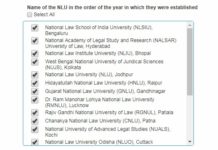It is a tad bit too late to write about this but better late than never and yes you do have a chance still.
We are talking about studying law abroad. Law in undergrad outside India.
First the basics.
There are two types of law systems in the world – one is the common law system that is prevalent across the erstwhile British Empire and the other is the civil law system that holds water in mainly other countries, France being a main proponent of that.
Now the LLB degree (LEGUM BACCALAUREUS ) is a world recognized degree that enables practice across major jurisdictions in the world but most countries prohibit foreign practitioners (India does too—the entire liberalization debate) and the only way they can is if there is a provision for a Qualifying Lawyer’s Test that is open to foreing citizens.
Let’s look at the major destinations for Indians who would want to study law abroad in the undergrad.
The major destinations are the U.K. and the U.S. New Zealand and Australia too are probable destinations but not too popular. One can also go to universities in those Canadian states that have a common law system.
Now I myself had applied to almost eight universities abroad and got calls from all of them but I had then been interested in pursuing finance but I did research on the broad pathway to ‘phoren land’ so I am to a degree aware of the general route.
For U.K. you need to apply to the respective universities with marks transcripts of your high school and your band score in the IELTS (International English Language Testing Service). Different universities have various benchmarks that you need to fulfill in order to be eligible for an entry. The entire UK admission scheme is handles through an UCAS system wherein you need to open your own account and pay application fees to individual universities and apply.
UK undergraduate law degree is an LLB degree which you can also combine with any other degree and get a dual certification in four years. You are entitled to practice in major jurisdictions across the world and it is also recognized in India.
To land up in U.S. you would need to take the LSAT and follow the college application procedure that is same for SAT. What you need to remember is that in U.S. you get a J.D. degree (Juris Doctor) in law and not the internationally recognized LLB degree and this is not recognized in India nor does the U.K. give you license to practice. With a J.D. you will have to stick to Uncle Sam and pass a Qualifying Lawyer’s Test to be eligible to enroll in the bar. You also need to take the TOEFL along with your LSAT. TOEFL is Test of English as Foreign Language.
NZ and Australia have similar systems comparable to the U.K.
Major concern is planning your finances with costs going upto even a crore if you consider board and lodging. Scholarships are hard to come by and never usually cover your entire tuition fees let alone your stay.
Singapore Management University too has opened a four year LLB course that is becoming popular amongst Indian applicants.
Check out the individual websites to know about international application processes and first of all see if your finances are in place. Do take into account escalation of costs, tax, insurance and others which are compulsory. Do not totally rely on foreign education agents as they sometimes are not totally honest in giving you the exact figures. Be ready to do a lot of odd jobs and menial work to supplement your cost of studies.
This is a little late in the day to apply but even now you do have time. So if you have the finances and the urge to go abroad do take the plunge.
All the Best!
Cheers.
S.D.















CLAT ei daant bhenge jachhe..LSAT !! Pagla naki ! 😛
(Literal Translation : CLAT is ‘only breaking my teeth’..LSAT !! Mad or what ! ) 😀
Premangsu – EGG-jactly!
Who wrote this?
S.D., by whom?
That is Sandipan De, Editor of News and Misc. Section, ClatGyan.
@ Sai … S.D = Sandipan De
@premangsu-tats bengali right?
@Premangsu… clat is not that tough…chaap nish na..thik kore kor…abroad is a good option if you can plan your finances….amar problem chhilo je I did not get offers of my choice
@ Manasa – Bang On ! Yes 😛
I solved some sample LSAT papers… it’s actually pretty easy… easier than CLAT… they have no GK… 🙂
The LSAT that you need to take for US law schools is different from the LSAT India which is the entrance test for Jindal and a few other law schools.
@ Aastha – You got it ! If you find their Logic Games and Arguments easy and if you think you can score in the 170+ range then – Yale is the place for you !
And that roughly translates into – you’re the ‘de facto’ CLAT topper. 😀 😛
But an undergraduate degree required to get a JD degree from US. 😐
You cannot have the JD as your first degree.
@Apurva – definitely yes. But the Americans need 16 years of education to be eligible for their degree. (Only select universities offer this). Hum Hindustanis exploit this and get the JD, with some BA from some Indian college (jugaad se).
I don’t know about law grads, but in engineering (where also a Bachelor’s is necessary), this is very often done.
WRT to Karthik’s point yes an undergrad degree is a prerequisite to JD in the U.S. but you may seek exemption or complete a BA Pass course in India for 2 years and go for it.
Not highly suggested.
UK option is a much better one with eligiblity to practice in India
@Premangsu – lol I doubt… I gave CLAT 2010 without any prep as such… so scored only 128… I’m so scared of gk… how do you think I should go about it…? Any tips on covering current GK? 🙂
@ Aastha. Read Aymen’s articles. He’s dealt with the topic well.
However, if one wants to practice in India it would be a bit irrelevant to have a foreign degree!
@Padmini, not quite correct. Let me tell you something I was told.
The day my NLUD results came out I met few advocates in a party and was all excited and told them I had made it. One asked what is the use of going to a National Law University if you want to practice. You might as well go to Calcutta Univ. Faculty of Law. A barrister(from Inns of Court, England) replied that it is about the quality of education in law that you receive — an NLU will equip you with such skills that shall make a brilliant litigator out of you. Its the same argument with foreign law schools, whether you want to practice or not if you get a quality education you may go abroad, but only to countries which is recognised by BCI. Like earlier times you too could come back as a barrister though the differentiation is no more applicable in India. Remember it’s the quality of the education and not only what you want to after the degree. NALSAR NLSIU and NUJS are no less competent in this regard. Better to study here than go to a tier 2 foreign university though.
All the best.
Cheers!
Hey!
I am studying in 12th …and i am interested in pursuing llb from abroad but want to practice as majestrate in India…. besides, i haven’t did clat yet…is it necessary to do clat even if i persue llb from foreign University ? Or according to you which university should i apply in and what route should i follow? ( I am a commerce student)
Kindly respond as quick as possible coz i need to do proceed further…..
Thanks for that, it cleared up quite a few doubts.
What I wanted to know is, the judicial system in ,say, the US is different from that in India, right? SO, wouldn’t it make more sense to study here if we want to practice here?
@Karthik – yeah sure. thanks! Hope it’s not too late for me! 🙂
Sandipan, could you put in some university names too?
Just a couple which are right at the top. Not a comprehensive list by any means.
If, supposing I wanted to study law here and then go to the U.S to practice, would that be possible, would I be allowed to do that?
12 cleared can I go for law abroad in us …which law schools are best and what are the requirements..like do they ask for bachelor degree here can’t I get there without bachelors degree
Hi,
I am a student of 12th grade wanting to pursue a law degree. I plan to live and practice in India in the future. Keeping that in mind, would you suggest doing undergrad (LLB) in India or abroad?
If I went abroad for undergrad, would I be disadvantaged in any way, when I come back to practice?
hi, i m a 10th std student and i want to take admission in NSLIU Banglore. what preparations should i do and what are the procedures i should follow to take admission ?
in oxford the law degree given is jurisprudence which is a 3 yr degree(opt. 4th year)…so do i need a 2 years undergraduate degree to apply for this.is this recognised in india?
also can you please give some information about the scholarships for going abroad.
Hii!
I wanted to ask if I could complete my undergraduation in India & then my post graduation in abroad. Is that suitable?
But where we can apply to pursue BA LLB and these all exams I have to give ilents, toafl, and LSAT